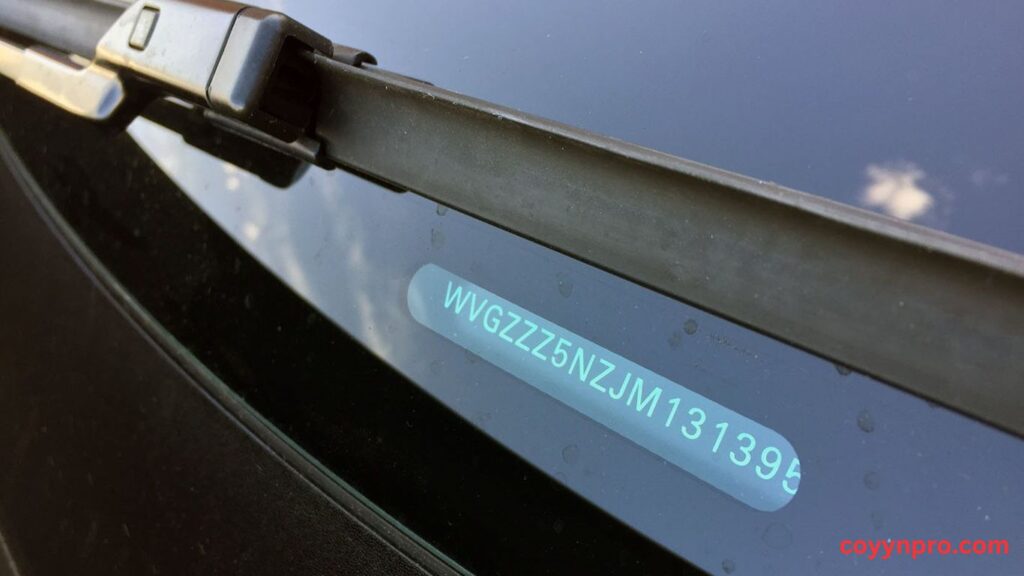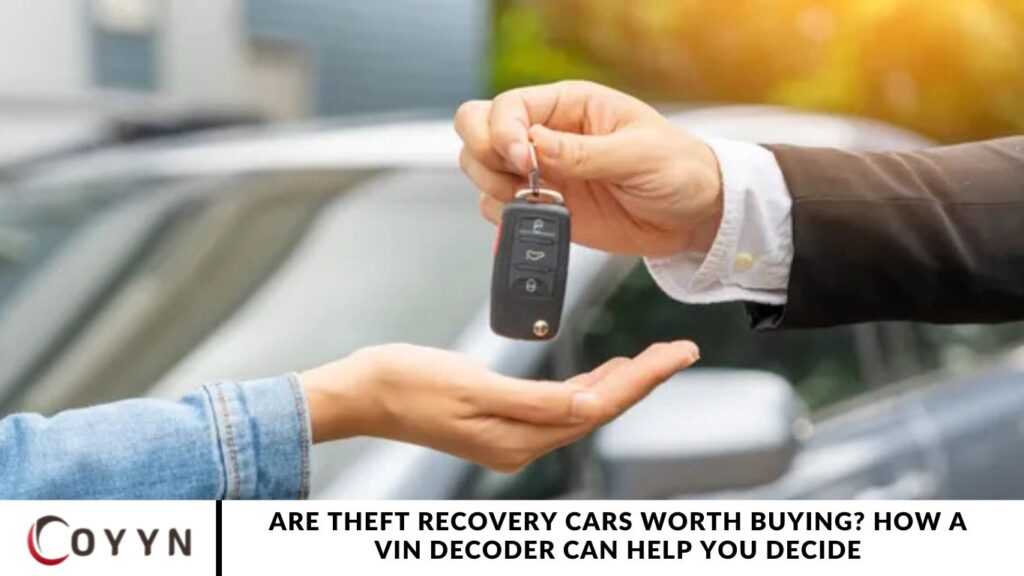Purchasing a vehicle is more than just checking off a task — it’s a significant investment that impacts your finances, safety, and long-term peace of mind. Theft recovery cars often attract buyers with their appealing price tags, but behind those low prices can lie a complicated history. Before you get swept up by the savings, it’s crucial to fully understand what you’re investing in. Using a VIN decoder can uncover hidden issues and protect you from costly surprises down the road.
Table of Contents
Understanding Theft-Recovered Vehicles
A theft recovery car is a vehicle that was reported stolen, listed in police records, and later recovered — either returned to its original owner or claimed by the insurance company. On the surface, it may appear to be in excellent condition. However, once a car carries a stolen history, that designation often stays with it permanently.
If the vehicle was missing for an extended period, stripped for parts, or damaged during the theft, it’s typically assigned a salvage title. In some cases, local laws allow insurance companies to declare a total loss even if the recovered car shows minimal or no visible damage simply because a payout has already been issued.
As a result, when theft recovery vehicles re-enter the market, they aren’t just considered used — they come with a permanent branded title that impacts value, insurability, and resale prospects.
Why Theft Recovery Cars Offer a Tempting Deal
Significant Savings
For budget-conscious buyers, theft recovery cars can be incredibly tempting. Often priced thousands of dollars below comparable models with clean titles, they offer significant upfront savings. The catch? That lower price reflects the vehicle’s branded status. However, for savvy shoppers, purchasing a stolen recovered car can be a smart way to maximize their budget and afford a newer model or one packed with premium features.
Recovered Doesn’t Always Mean Damaged
Despite common misconceptions, not all stolen vehicles are severely damaged. Many theft recovery cars are mainly found intact, sometimes with nothing more than missing keys or minor cosmetic issues. When a recovered vehicle passes a detailed inspection, it can turn out to be an excellent find.
However, relying on assumptions is risky. A full vehicle history report is essential to confirm the car’s complete background and ensure you know exactly what you’re buying.
Pros and Cons of Buying Theft-Recovered Cars

Pros of Purchasing Theft-Recovered Vehicles
Significant Discounts That Deliver Real Savings
Vehicles with salvage or theft recovery titles often sell well below market value, making high-end trims or newer models more attainable for budget-conscious buyers who know what to look for.
Great Opportunities for Skilled Buyers
If you’re mechanically savvy or have access to a trusted mechanic, you’re in a strong position to thoroughly inspect the vehicle, identify potential issues, and avoid costly mistakes.
Minimal or No Damage in Some Recoveries
In many cases, theft-recovered vehicles are returned with little to no damage — sometimes simply requiring a new set of keys or essential maintenance after being misplaced and quickly recovered.
Structurally Sound Vehicles
Unlike accident-damaged salvage cars, many theft recovery vehicles retain their original frame integrity. Issues are often limited to missing parts or cosmetic wear; there are no major structural problems.
More Value for Your Investment
If resale value isn’t a top concern, buying a stolen, recovered car could allow you to drive a newer, better-equipped vehicle for a fraction of the typical cost.
Cons of Purchasing Theft-Recovered Vehicles
Insurance and Financing Obstacles
Securing insurance for a salvage title vehicle can be challenging. Some insurance companies refuse to cover them altogether, while others offer only limited coverage or charge significantly higher premiums. Financing is also tricky, as many lenders view salvage vehicles as high-risk and may deny loans. It’s crucial to read the fine print carefully and understand each provider’s specific requirements before proceeding.
Lower Resale Value
Even after complete repairs, stolen recovered vehicles typically have a reduced market value. Future buyers often shy away from any car with a branded title, regardless of its actual condition or performance.
Potential Hidden Repair Costs
What seems like a bargain could turn into a costly investment. Missing components, damaged electronics, or compromised systems may not be immediately apparent. To avoid expensive surprises, a thorough post-theft inspection by a certified mechanic is highly recommended before finalizing any purchase.
Legal and Registration Complications
Depending on state laws, registering a salvage title vehicle can be complicated. Extra inspections, extensive paperwork, and proof of proper repairs may be required before the vehicle is legally allowed on the road.
Difficulties in Selling or Trading In
A salvage title remains with the vehicle for life, making it much harder to sell or trade-in later. Many dealerships refuse to accept branded title vehicles, and private buyers may hesitate—even if the car runs perfectly.
Why You Need a VIN Decoder
Buying a stolen, recovered car should never be a decision made on impulse. A VIN decoder provides critical insight into the vehicle’s history, revealing where it has been and what it has experienced.
With a VIN check, you can uncover key details like previous salvage titles, total loss declarations, multiple sales records, and mileage discrepancies. This level of transparency helps you avoid inheriting costly problems from a car’s past.
That’s why securing a comprehensive vehicle history report isn’t just a recommendation — it’s essential.
For reliable, accurate results, trust the EpicVIN VIN Decoder. It delivers complete access to title history, repair records, ownership timelines, and more, empowering you to make informed, confident buying decisions.
What to Check Before Buying
VIN Number
Start with the vehicle’s 17-digit VIN. It’s your gateway to unlocking the car’s complete history.
Vehicle History Report
Verify past events like total loss claims, significant repairs, ownership transfers, and title status changes.
Professional Inspection
Have a qualified mechanic conduct a thorough inspection to uncover hidden damage or mechanical issues.
Insurance Coverage
Confirm which insurance providers are willing to cover the vehicle — and understand any added costs or coverage limitations.
Repair Estimates
Assess any visible damage, missing parts, or poor-quality repairs to estimate potential restoration costs accurately.
State Registration Requirements
Research what your state requires to legally register a salvage or rebuilt title vehicle, including inspections and paperwork.
Title Status Verification
Before finalizing your purchase, check if the car has been rebuilt, stripped for parts, rebranded, or flagged for prior damage.
Future Resale Value
Understand that selling or trading in a branded title vehicle will likely be more complex and yield lower returns.
Post-Recovery Certification
Request documentation that proves the car passed all necessary inspections after being recovered.
Specific State or Lender Requirements
Some states and lenders impose additional requirements beyond a clean history report — make sure you’re fully informed.
Who Should Consider a Theft-Recovered Car?
- Budget-Conscious Shoppers — Those looking to maximize savings without sacrificing quality.
- DIY Enthusiasts and Mechanics — Buyers are comfortable handling minor repairs or maintenance themselves.
- Long-Term Owners — Individuals planning to keep the vehicle for many years rather than resell it.
- Value-Over-Resale Buyers — Those who prioritize initial savings over future resale value.
Who Should Avoid It?
- First-Time Buyers — Those unfamiliar with vehicle repairs or potential risks.
- Insurance Coverage Seekers — Buyers who require comprehensive insurance, which may be limited or expensive for salvage title vehicles.
- Short-Term Owners — Individuals planning to resell the vehicle within a few years, as resale may be challenging with a branded title.
- Buyers Unable to Inspect Thoroughly — Those who cannot conduct or afford a professional inspection may overlook hidden issues.
How Does a VIN Reveal a Vehicle’s History?
The VIN is your key to unlocking a vehicle’s entire history. By using a VIN lookup service or a comprehensive vehicle history report from providers like CARFAX or VIN Verify, you can uncover crucial information such as:
- Accident History — Was the car involved in any accidents or collisions?
- Previous Owners — How many owners has the vehicle had, and where has it been registered?
- Service Records — Has the car been well-maintained with regular servicing?
- Recalls — Are there any outstanding safety recalls that need addressing?
- Liens — Are there any unpaid debts or legal claims tied to the vehicle?
These details give buyers the clarity needed to make informed decisions and avoid purchasing a vehicle with hidden issues or costly surprises.
Professional VIN etching services in Canada
Several trusted companies across Canada offer VIN etching services. These services are conducted by skilled technicians who use high-quality materials to ensure the markings are durable, discreet, and tamper-resistant.
VIN Lock’s expert etching services, available through accredited partners like UniglassPlus, deliver precision and long-lasting results. This proactive approach provides vehicle owners with peace of mind by significantly reducing the resale value of stolen vehicles on the black market. Additionally, each etching is linked to a digital trace, making it easier to track stolen cars and increasing the likelihood of recovery.
While all vehicles are vulnerable to theft, owners of newer or high-end vehicles should especially consider investing in professional VIN etching to bolster their vehicle’s security.
Frequently Asked Question
What is a theft recovery car?
A theft recovery car is a vehicle that was reported stolen, entered into police records, and later recovered. After being returned to the original owner or insurer, it’s often put back on the market for resale.
How does a VIN decoder help with theft recovery cars?
A VIN decoder allows you to access the car’s entire history, including accident records, salvage titles, and previous ownership. This information can help you assess whether the vehicle has hidden issues that could affect its safety or value.
Are theft recovery cars cheaper than other used vehicles?
Yes, theft recovery cars are often priced lower than similar models with clean titles. However, the reduced price comes with the risk of hidden damages or a branded title that can affect insurance, resale value, and financing.
Can I get insurance for a theft recovery car?
Insurance for theft recovery cars can be tricky. Some insurance companies may refuse to cover them, while others may offer limited coverage or charge higher premiums. It’s essential to check with your insurer before making a purchase.
What risks are associated with buying a theft recovery car?
The main risks include hidden damages, reduced resale value, challenges with insurance and financing, and potential legal or registration hurdles due to the vehicle’s branded title.
How can I verify the condition of a stolen recovery car?
A comprehensive vehicle history report, obtained through a VIN decoder or services like CARFAX, can help you uncover the vehicle’s past, including whether it was involved in accidents, had a salvage title, or suffered from significant damage.
Should I be worried about the resale value of a theft recovery car?
Yes, theft recovery cars typically have lower resale value due to their branded title. Future buyers may be hesitant to purchase them, even if they’re in good condition.
Conclusion
Buying a theft recovery car can be a smart option for buyers looking to save money, but it’s not without risks. While these vehicles may come at a significantly lower price, their branded title can impact everything from insurance and financing to resale value. To make an informed decision, it’s crucial to fully understand the car’s history, and that’s where a VIN decoder comes into play.
By using a VIN decoder, you gain access to vital information like accident history, past ownership, and salvage titles. This helps you identify potential issues before committing to a purchase. A comprehensive vehicle history report ensures you’re not unknowingly taking on someone else’s problem.


